#21: Ballad of You & Me & Pooneil by Jefferson Airplane
City: Edmonton, AB
Radio Station: CJCA
Peak Month: October 1967
Peak Position in Edmonton: #5
Peak position in Vancouver ~ #17
Peak Position on Billboard Hot 100 ~ #42
YouTube: “Ballad Of You, Me And Pooneil”
Lyrics: “Ballad Of You, Me And Pooneil”
Paul Kantner was born in San Francisco in 1941. His mother died when he was eight, and his father sent him to see the circus instead of allowing him to attend the funeral. Kantner was sent to a Catholic Military boarding school. In the face of his strict upbringing, Paul Kantner became interested in Pete Seeger, folk and protest songs. At the University of Santa Clara he met Jorma Ludwik Kaukonen, Jr. Born in 1940, Jorma Kaukonen was from Washington D.C. and had Finnish and Russian Jewish roots. His family lived in Pakistan for awhile before they returned to Washington D.C. where Jorma formed a band called the Triumphs. From 1962 he was a solo act in the San Francisco Bay area. In 1964, he recorded a solo album with Janis Joplin playing acoustic guitar on “The Typewriter Tapes”, given that name due to his spouse typing on the typewriter in the background.
Jorma suggested the name Jefferson Airplane for the band, named after an eccentric friend’s dog called Blind Lemon Jefferson Airplane. Martyn Jerel Buchwald was born in Cincinnati, Ohio, in 1942. His father was Jewish and his mother was Episcopalian. During his childhood he was diagnosed as autistic. In 1962, Buchwald changed his name to Marty Balin, and began recording with Challenge Records in Los Angeles, releasing the singles “Nobody But You” and “I Specialize in Love”. By 1964, Balin was leading a folk music quartet called The Town Criers. John “Jack” Casady was born in 1944 in Washington D.C. He played with Jorma Kaukonen in the Triumphs in Washington D.C. With a forged I.D. he played in D.C. area clubs, backing bands like Little Anthony and the Imperials. It was Jorma who invited Jack Casady to join the newly formed Jefferson Airplane, replacing the original bass player Bob Harvey. Spencer Dryden was born in New York City in 1938. His father was a half-brother to Charlie Chaplin and moved the family to Los Angeles to work as an assistant to Chaplin. Dryden learned to play drums from a young age, and was in a jazz band called the Smog City Six. When Spencer was 19 years old his father died. In 1966, Spencer Dryden was recruited to be the drummer for Jefferson Airplane, replacing Skip Spence. The lead vocalist for the band was Signe Toly Anderson.
On January 1966, Jefferson Airplane performed in Vancouver (BC) at the UBC Armory. The band released its first single, “It’s No Secret” which charted in San Francisco and Salt Lake City. In the fall of 1966, “Bringing Me Down” charted in a half dozen radio markets across six states.
Grace Barnett Wing was born in 1939 in Highland Park, Illinois, a suburb of Chicago. In August 1961, Wing married Gerald “Jerry” Slick, an aspiring filmmaker. After the couple briefly moved away from San Francisco, Grace Slick worked as a model at an I. Magnin department store for three years. Slick also started composing music, including a contribution to a short film by Jerry Slick. In August 1965, Slick read an article in the San Francisco Chronicle about the newly formed Jefferson Airplane. Despite being situated in the growing musical center of San Francisco, Slick only half-heartedly considered music for a profession until she watched the band live at The Matrix. As a result, Slick became a vocalist and guitar player in a group called the Great Society, accompanied by husband Jerry Slick on drums, Jerry’s brother Darby Slick on guitar, and David Miner on bass guitar. On October 15, 1965, the band made its debut performance at a venue known as the Coffee Gallery. Soon after, Slick composed “White Rabbit”. She also sang “Somebody To Love” written by Darby Slick. Live performances of these and other material got the Great Society rave reviews.
When Jefferson Airplane vocalist, Signe Toly Anderson, decided to leave the band in 1966 to raise her first child. Touring with Jefferson Airplane had become unmanageable. As a result, Grace Slick was invited to join the band. Jefferson Airplane had released the folk-rock album Jefferson Airplane Takes Off in 1966. A single titled “Come Up The Years” peaked at #18 in San Francisco and #22 in Buffalo. The band with Grace Slick as the lead singer performed in Vancouver (BC) on November 9, 1966 at the Queen Elizabeth Theatre.
On January 14, 1967, the Jefferson Airplane headlined the Human Be-In at Golden Gate Park in San Francisco. Timothy Leary spoke to the crowd and invited them to “turn on, tune in, and drop out.” Other speakers were Richard Alpert (soon to be named Ram Dass), Alan Watts, Allen Ginsburg, Jerry Rubin and others. Along with Jefferson Airplane were Big Brother and the Holding Company which featured Janis Joplin, Blue Cheer and Quicksilver Messenger Service. The Human Be-In took its name from humanist values, and teach-ins (an educational forum without boundaries about what can be discussed and when the discussion ends) and sit-ins (form of direct action) during the Civil Rights Movement.
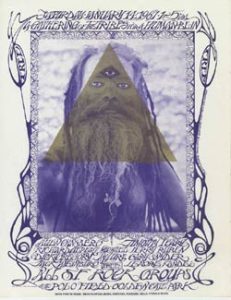
Human Be-In poster, January 14, 1967
In 1967 the Jefferson Airplane veered toward psychedelic rock with the release of Surrealistic Pillow. The debut single from the album, “My Best Friend”, stalled at #103 on beneath the Billboard Hot 100. Though it climbed to #2 in San Jose (CA),#3 in Hoquiam (WA), #4 in Santa Rosa (CA), #6 in San Francisco, #9 in Davenport (IA), and #10 in Fresno (CA). In February 1967, Surrealistic Pillow climbed to #3 on the Billboard 200 Album chart. It remained on the album chart for a year. It also made the Top 20 on the album charts in Finland and Sweden, and the Top Ten in Canada and the UK. In 2012 the album was rated #146 by Rolling Stone on their 500 Greatest Albums of All Time list.
Surrealistic Pillow contained the hit single in the spring of 1967 titled “Somebody To Love”. It climbed to #5 on the Billboard Hot 100, #4 in Vancouver (BC) and #2 in Edmonton (AB). While the single was on the CFUN chart in Vancouver, Jefferson Airplane performed in concert at the Vancouver Trips Festival at the Richmond Arena on May 27, 1967. The Magic Fern, the Painted Ship and the Collectors also performed. Two weeks later, the Jefferson Airplane appeared in concert at the Monterey International Pop Festival. The Jefferson Airplane also appeared on The Ed Sullivan Show, The Smothers Brothers Comedy Hour and The Tonight Show Starring Johnny Carson.
A second single from the album, “White Rabbit”, peaked at #8 on the Billboard Hot 100. It also climbed to #1 in Vancouver for two weeks in July 1967. In August 1967, the Jefferson Airplane performed two concerts in Montreal, one of these at the Youth Pavilion at Expo ’67.
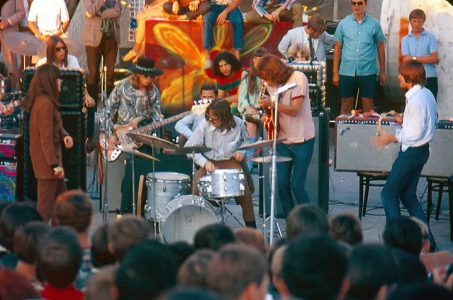
Jefferson Airplane at Expo ’67 Youth Pavilion
The Jefferson Airplane’s third studio album was After Bathing at Baxter’s. The front cover depicts the band as a World War I-era triplane with the body of a San Francisco townhouse. Cannabis plants are shown growing out of the house’s flower boxes. The artwork is framed with a red bar on the bottom and a blue bar with white stars on the top, signifying the United States flag. The plane, painted in full color, dispenses confetti while flying over a black and white landscape – embodying the white of the flag – with billboards reading messages such as “CONSUME!” and “DRINK IT” as parodies of American consumerism. The illustration continues onto the back cover, revealing a scrapheap followed by a pile of empty beverage cans. A banner attached to the plane displays the album’s title.
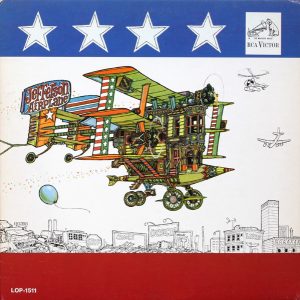
The original artwork for the album, by political cartoonist Ron Cobb, was sold in 2008 for $24,000.
The debut single from the album was “Ballad Of You & Me & Pooneil”.

Paul Kantner wrote the “Ballad Of You & Me & Pooneil”. “Pooneil” refers to singer/songwriter Fred Neil, who was a very influential folk musician. Neil wrote “Everybody’s Talkin'”, a hit for Nilsson. Fred Neil apparently was not concerned with fame but was respected for his musical talents and had a devoted following that included many prominent musicians. In the lyrics of “Ballad Of You & Me & Pooneil”, Pooneil never is mentioned. But, as we learn, the song borrows from A.A. Milne, the author of Winnie the Pooh. So the “Poo” in “Pooneil” comes from Winnie The Pooh. While “Pooneil” is a hybrid of Winnie the Pooh and Fred Neil.
The song casts visions, metaphors and similes to express an amorous relationship. The singer exclaims “I do know that I need to have you around.” They think if their lover was a bird they would go where the wind took them. The lines are identical to the A.A. Milne stanza in “Spring Morning” that reads:
If you were a bird, and lived on high,
You’d lean on the wind when the wind came by,
You’d say to the wind when it took you away:
“That’s where I wanted to go today!”
The singer imagines their lover is like a cloud who looks down on them to see them in a green field. The line in the song is taken almost word-for-word from the A.A. Milne poem “Spring Morning”. In it A.A. Milne wrote
If you were a cloud, and sailed up there,
You’d sail on water as blue as air,
And you’d see me here in the fields and say:
“Doesn’t the sky look green today?”
“Spring Morning” was one of 44 poems from the A.A. Milne children’s book When We Were Very Young.
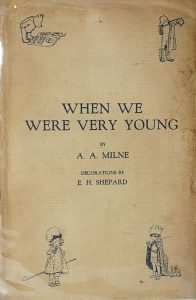
Moreover, in “Ballad Of You & Me & Pooneil” the lover professes: “Love like a mountain springtime, flashing through the rivers of my mind – it’s what I feel for you.”
The singer laments that “there’s too many people around me.” So they go to their own house and sit on a stair and think about the relationship. The line about the stairs in the house are taken from the A.A. Milne poem “Halfway Down”. In the poem, A.A. Milne wrote
Halfway down the stairs
Is a stair
Where I sit.
There isn’t any
Other stair
Quite like
It.
I’m not at the bottom,
I’m not at the top;
So this is the stair
Where
I always
Stop.
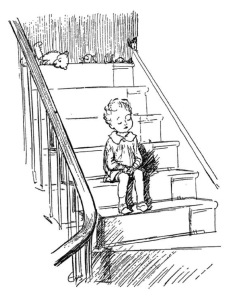
“Ballad of You & Me & Pooneil” peaked at #2 in Riverside (CA), #3 in Vancouver (WA), #5 in Edmonton (AB), San Jose (CA), and San Francisco, #7 in Oxnard (CA), and Salinas (CA), #9 in Santa Barbara (CA), and #10 in Davenport (IA).
In December 1967, the single “Watch Her Ride” made the playlist on CKLG in Vancouver (BC).
On June 28, 1968, Jefferson Airplane appeared on the front cover of Life magazine in a feature about the new rock music.
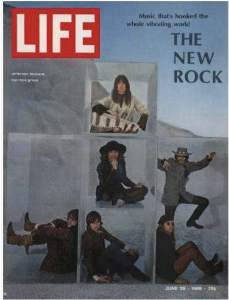
In 1968, Grace Slick performed “Crown Of Creation” on The Smothers Brothers Comedy Hour in blackface, and ended her performance with a Black Panther raised fist. The album, Crown of Creation climbed to #6 on the Billboard 200 Album chart. In August and September 1968, Jefferson Airplane toured Europe with The Doors. This was followed by the February 1969 release of their live album, Bless Its Pointed Little Head, which peaked at #17 on the Billboard 200 Album chart.
On August 16, 1969, Jefferson Airplane were the headliner to close the 2nd day of music at the Woodstock Music and Art Fair. Other recording acts performing on stage that day include Santana, John Sebastian, Canned Heat, Grateful Dead, Creedence Clearwater Revival, Janis Joplin, Sly & the Family Stone, and The Who.
On October 10, 1969, the Jefferson Airplane returned to Vancouver to perform at the PNE Agrodome.
In November 1969 the band released “Volunteers”, which stalled at #65 on the Billboard Hot 100. An album titled Volunteers of Amerika was shortened to Volunteers after complaints from the affordable housing nonprofit organization the Volunteers of America. Spelling “America” as “Amerika” was a common practice used in the Sixties counterculture at the time to emphasize their dissatisfaction with the American government, and in homage to the Franz Kafka novel Amerika. The album was controversial as the track, “We Can Be Together”, included the Black Panther phrase “Up against the wall, motherfucker.” The phrase was taken from the 1968 Amiri Baraka poem “Black People”. The phrase was borrowed from a report in the news of Newark, New Jersey, police telling a group of “American negroes” in custody, “Up against the wall motherfucker. This is a stick up!” Volunteers peaked at #13 on the Billboard 200 Album chart.
The Jefferson Airplane were the only recording act to perform at Monterey, Woodstock and the Altamont Speedway Free Festival. The December 6, 1969, festival was a hoped-for “Woodstock West.” But Hell’s Angels security knifed 18-year-old Meredith Hunter who died during the Rolling Stones set. Jefferson Airplane, Santana, the Flying Burrito Brothers, and Crosby, Stills, Nash & Young, played earlier that day. Hunter had appeared close to the stage with a revolver, and was knifed by Hell’s Angel Alan Passaro. A jury ruled that Passaro had acted in self-defense. Grace Slick recalled that once Jefferson Airplane arrived at the festival, “The vibes were bad. Something was very peculiar, not particularly bad, just real peculiar. It was that kind of hazy, abrasive and unsure day. I had expected the loving vibes of Woodstock but that wasn’t coming at me. This was a whole different thing.” Altamont was a catalyst for Spencer Dryden’s departure from the band in early 1970.
In 1970 a compilation album, The Worst of Jefferson Airplane, climbed to #12 on the Billboard chart. In 1969 Jorma Kaukonen and Jack Casady formed Hot Tuna, a blues rock band.
And in 1971, despite not having any commercially successful singles, Bark climbed to #11 on the Billboard 200 Album chart. In November 1970, Jefferson Airplane stopped touring as Grace Slick and Paul Kantner were about to become parents of China Kantner. In 1971, Grace Slick and Paul Kantner released an album of duets titled Sunfighter. It featured a photo of China Kantner on the album cover. The seventh studio album by Jefferson Airplane, Long John Silver, became their eight album – studio or live – to crack the Top 20.
In 1974, Jefferson Airplane dissolved. A new iteration of the band was formed around Grace Slick, Paul Kantner, Jorma Kaukonen, (and Marty Balin in 1975), along with Papa John Creach on violin, former Turtles and Crosby, Stills, Nash & Young drummer John Barbata, bass guitarist and keyboardist Pete Sears, and guitarist Craig Chaquico. Jefferson Starship became part of the soundtrack of the seventies with “Miracles”, “Count On Me”, “Runaway” and “Jane”.
A third iteration of Jefferson Airplane began with the launch of Starship in 1984. The pop-rock sound of Starship gave them four international hits “We Built This City”, “Sara”, “Nothing’s Gonna Stop Us Now”, and “It’s Not Over (‘Til It’s Over)”.
The original Jefferson Airplane had a reunion in 1989, with the exception of Spencer Dryden. They released a self-titled album, and had a successful tour. In 2003 Jack Casady released his only solo album to date titled Dream Factory. Jorma Kaukonen and Jack Casady continue to perform in their band now named Electric Hot Tuna. The Hot Tuna discography consists of fifteen albums released between 1970 and 2019.
In 2016, Jefferson Airplane received a Grammy Lifetime Achievement Award.
In 2018, Kaukonen published his memoir Been So Long: My Life and Music. Spencer Dryden died of colon cancer in 2005 at the age of 66. Paul Kantner died at the age of 74, in 2016 after a multiple organ failure after he had a heart attack. Marty Balin died in 2018 at the age of 76. In 2022, Jefferson Airplane received a star on the Hollywood Walk of Fame.
November 22, 2023
Ray McGinnis
References:
Colin Stutz, “Paul Kantner, Jefferson Airplane Co-Founder & Guitarist, Dies at 74,” Billboard, January 28, 2016.
Randy Lewis, “Marty Balin, co-founder of Jefferson Airplane, dies at 76,” Los Angeles Times, September 28, 2018.
“Spencer Dryden, Drummer For Jefferson Airplane, Dies,” WPBF-ABC, West Palm Beach, FL, January 14, 2005.
Jorma, Kaukonen, Been So Long: My Life and Music. St. Martin’s Press, 2018.
“Interview: Jack Casady,” Music Illuminati, January 1, 2012.
Grace Slick and Andrea Cagan, Somebody To Love?: A Rock and Roll Memoir, Grand Central Publishing, 1998.
“A.A. Milne, “Spring Morning“, from When We Were Very Young, Metheun & Co. Ltd., 1924.
“Jefferson Airplane Receive Hollywood Walk of Fame Star,” October 14, 2022.
“Jefferson Airplane Concert Dates – Canada,” setlist.fm.
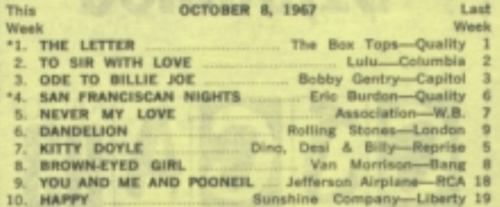
CJCA 930-AM, Edmonton (AB), October 8, 1967

Leave a Reply